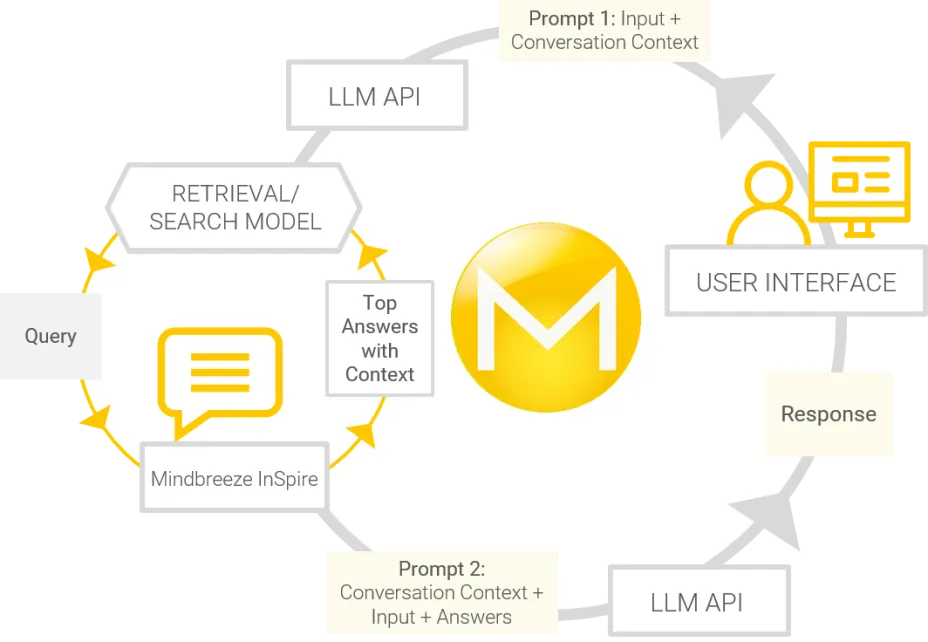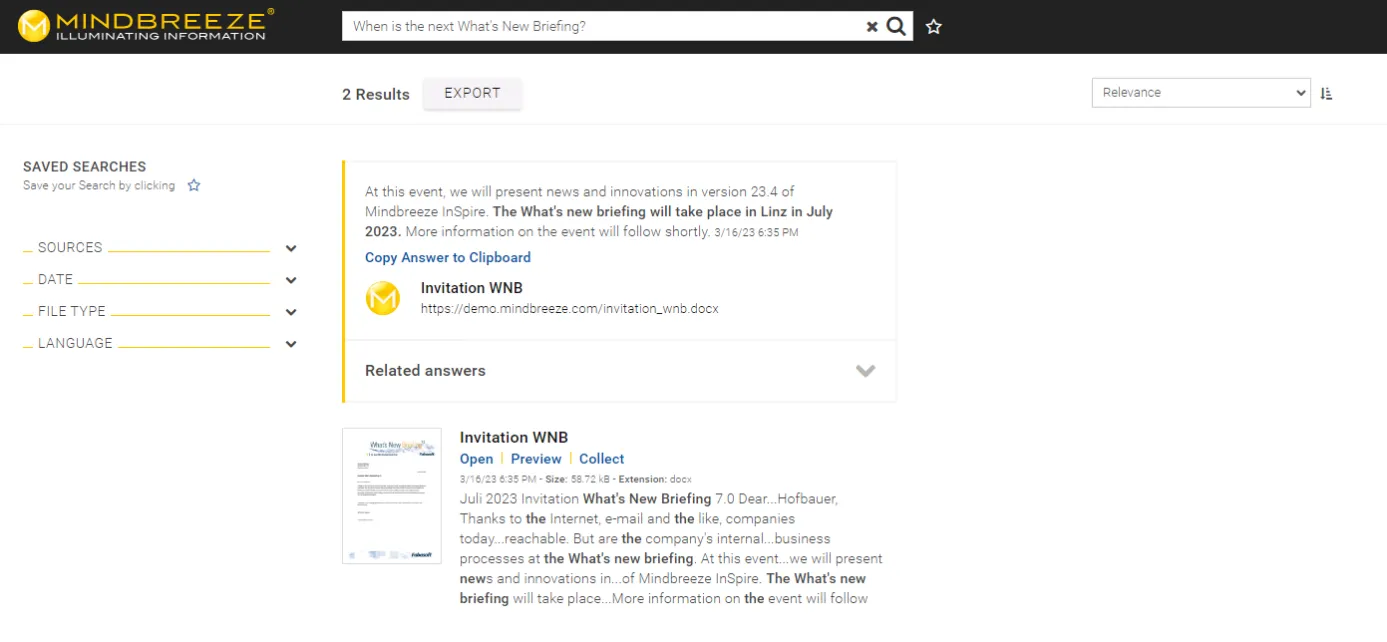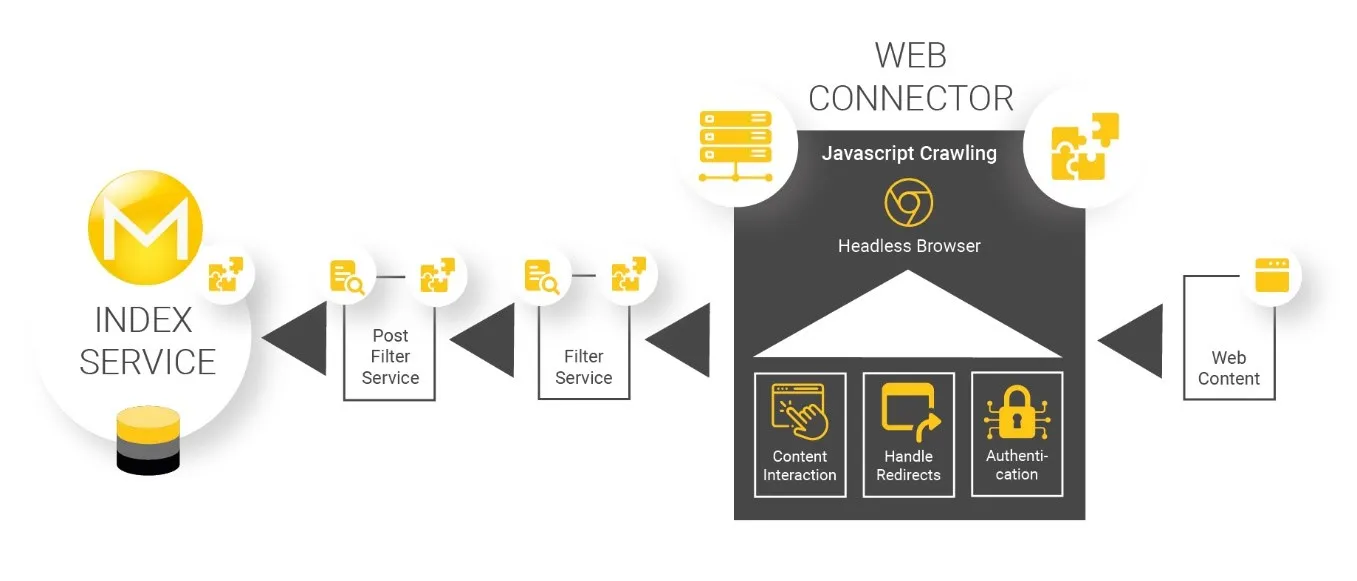Innovations in the Mindbreeze InSpire 23.4 Release
In the Mindbreeze InSpire 23.4 release, our expert development team implemented various innovations, especially in generative AI and large language models.
Read all the highlights of the Mindbreeze InSpire 23.4 release below:
Extension of semantic search - AI-based understanding of content
Large language models (LLMs) have exceptional human language processing and generation capabilities. Insight engines, like Mindbreeze InSpire, can overcome security and relevancy hurdles through data timeliness, connectivity, and source validation, making it possible to work with complete sentences and map the content understanding of the LLM. Transformer-Based Language Models in ONNX format form the basis for semantic search. By using open standards, customers can integrate and use pre-trained models or self-trained LLMs in Mindbreeze InSpire.
With Mindbreeze InSpire, customers can use Generative AI immediately, as it is seamlessly integrated into the product. Data security plays an overriding role and is ensured by constantly checking permissions directly within the individual data sources. The connectors ensure that the content is always up to date. Thanks to the scalable architecture and the customizable relevance models, customers can personalize their interactions with the Insight Engine.

Question Answering - Mindbreeze InSpire now provides answers in context
Based on the deep integration of LLMs into the core of Mindbreeze InSpire and semantic search, the Question Answering feature can now provide answers in natural language. Mindbreeze's years of experience enable high scalability when processing large data sets. Mindbreeze InSpire can generate information in different languages thanks to the integration of multilingual models. For example, a user can ask a question in German and receive an answer in English. In addition to the results, source information is available to users to ensure traceability of answers and permissions. Previous and subsequent sentences are shown alongside the actual answer to provide the user with the necessary context.
With relevance models, the "Question Answering" feature can also be adapted to the user's needs. Users can independently configure which parameters are used to measure the relevance of the answers and, therefore, can influence the resulting responses.
More information is available in our documentation.
Simplified resetting of filters within the Insight app
Mindbreeze users can refine their search results using filters to obtain a more accurate list of results and, thus, more efficient access to corporate information. The Mindbreeze administrator can configure the corresponding filters for different metadata.
To improve the handling of the filters, the Reset filters option has now been added with the Mindbreeze InSpire 23.4 release. This appears as soon as a filter is active (see the following screenshot) and resets all active filters at the push of a button.

Read more in our documentation
Advanced configurability of JavaScript crawling script behavior
The JavaScript crawling functionality enables automatic and script-based simulation of user input when crawling complex web pages, making indexing and searchable websites with login masks, popups, or delayed loading content possible. With the Mindbreeze InSpire 23.4 release, different scripts can now be defined per sub-URL to index more complex websites that require various script behaviors with a single crawler.

You can find more information in our documentation.
In addition, numerous innovations to our connectors and some technical optimizations were realized, and security-relevant changes were made.
Do you want to learn more about our 23.4 release? All new features and additional information can be found in our Release Notes. Also, don't forget to register for our webinar on August 3, 2023, to learn all the new features of the 23.3 and 23.4 release hands-on.
Latest Blogs
Boosting Enterprise Intelligence with Tool Calling
Introduction: A New Era of Intelligent SearchMindbreeze understands that enterprise needs have evolved. It is no longer sufficient for AI systems to retrieve documents or surface static answers. Tool calling meets this demand head-on.
Scaling Agentic AI and the Future of Enterprise Intelligence: A Conversation with Daniel Fallmann on The Digital Executive Podcast
AI continues to transform how organizations harness their information—and in the latest episode of The Digital Executive Podcast, our CEO and founder Daniel Fallmann sits down with host Brian Thomas to share how Mindbreeze is setting a new standard with en






